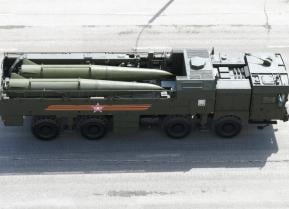Will Donald Trump Take a 'Wrecking Ball' to NATO?
Analysts are uncertain if Donald Trump would genuinely reduce NATO support, though experts suggest he may use the threat to push Europe toward more self-defense responsibility.
What Does Trump Victory Mean For NATO?: NATO Secretary General Mark Rutte congratulated President-elect Donald Trump on Wednesday, saying he looked forward to working to "advance peace through strength" via the international military alliance. Rutte highlighted the threats from a "more aggressive Russia" and from an "increasing alignment of China, Russia, North Korea and Iran."
Rutte also reminded the former and now future president that the U.S. could be far stronger thanks to its commitment to the organization.
"Through NATO, the US has 31 friends and Allies who help to advance US interests, multiply American power and keep Americans safe," said Rutte. "Together, NATO Allies represent half of the world's economic might and half of the world's military might."
By working with NATO members, Rutte further suggested that it will support the greatly intertwined economies, and that President-elect Trump should understand that NATO is now "stronger, larger, and (a) more united Alliance." Rutte also stressed that the members have fulfilled their commitment to reach spending goals.
"Two-thirds of Allies now spend at least 2% of their GDP on defence, and defence spending and production are on an onward trajectory across the Alliance," Rutte added.
Will That Be Enough?
The question being asked the day after Trump won a historic election is whether Trump will remain committed to NATO. On the campaign stump, he often talked about how America would not only turn its back on its allies but would allow Russia and other nations to essentially do "whatever the hell they want" as in perhaps invade, annex, or otherwise take over a NATO member that failed "pay its fair share."
At a South Carolina rally in February, Trump told attendees, "I said: Everybody's gotta pay. They said: Well, if we don't pay, are you still going to protect us? I said: Absolutely not. They couldn't believe the answer."
It remains unclear when that conversation occurred, or what nation's leader Trump made the comment to, and Trump further claimed he was asked if the U.S. would support a nation attacked by Russia if they failed to meet the 2% GDP spending requirements.
"No, I would not protect you," Trump said at the rally. "In fact, I would encourage them to do whatever the hell they want. You gotta pay."
Trump's apparent "friendship" with Russian President Vladimir Putin has also been seen as a concern, and as to whether the U.S. will simply allow Russia to prevail in its ongoing conflict in Ukraine. Moreover, the president-elect has called Ukrainian President Volodymyr Zelensky "one of the greatest salesman" for the military aid he received from Washington under the Biden administration.
That doesn't mean Trump would actually pull out of NATO.
"To be perfectly blunt, no one knows. He has no deep commitment to NATO and he has long argued that Europe should do much more to defend itself," Stephen M. Walt, Robert and Renee Belfer Professor of International Affairs, Harvard Kennedy School told Newsweek. "But he may prefer to stay in NATO in order to have influence over its policies, while constantly complaining about what the Europeans are doing and using the threat of withdrawal to coerce them on both economic and security matters."
Can the U.S. Afford to Go It Alone?
The final questions that really need to be asked is not whether the United States should leave NATO, or even if Europe is paying its fair share, but whether the U.S. can afford to leave NATO.
The U.S. Navy is a rusting mess that will need a decade or longer to reach its ship strength goals, while the U.S. Air Force is also struggling to fund its expensive programs. Even if the U.S. were to adopt a more isolationist stance, the military has only reached recruiting goals for the first time in nearly a decade.
The U.S. military needs allies in NATO, as well as in the Indo-Pacific to stand up to Russia, China, Iran, North Korea, and other global threats.
An America First agenda could be a step backward. While the oceans once kept America safe that likely won't be the case in the day of stealth aircraft, hypersonic weapons, and China's People's Liberation Army Navy (PLAN).
Author Experience and Expertise: Peter Suciu
Peter Suciu is a Michigan-based writer. He has contributed to more than four dozen magazines, newspapers, and websites with over 3,200 published pieces over a twenty-year career in journalism. He regularly writes about military hardware, firearms history, cybersecurity, politics, and international affairs. Peter is also a Contributing Writer for Forbes and Clearance Jobs. You can follow him on Twitter: @PeterSuciu. You can email the author: [email protected].
Image Credit: Creative Commons and/or Shutterstock.


